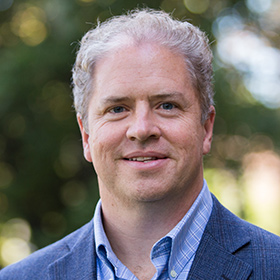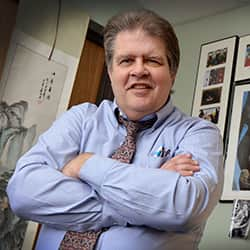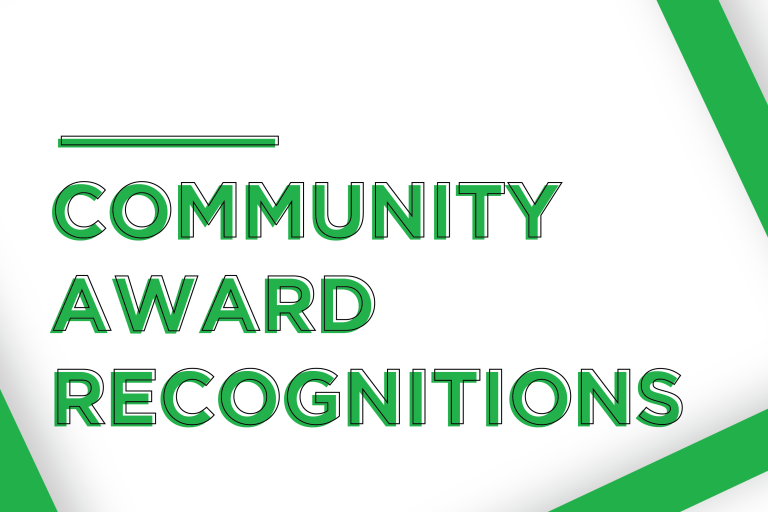Three ComArtSci faculty members have been selected as Michigan State University Distinguished Partnership Award recipients.
For the last five years, Michigan State University has awarded this series of four university-wide recognitions for highly engaged and scholarly community-based work that positively impacts both the community and scholarship.
This year, ComArtSci faculty members won two of the four awards, for Community-Engaged Teaching and for Community Engaged Service.
Johannes M. Bauer and Keith Hampton: Community-Engaged Service

Drs. Johannes M. Bauer and Keith Hampton will be recognized as the 2022 Distinguished Partnership Award for Community-Engaged Service recipients for their efforts to increase understanding of the cost of digital inequalities to rural students, and to help overcome discrepancies in access to high-speed internet connectivity.
“In collaboration with our partners, this project put the knowledge and expertise of university faculty and students to work to address real world problems faced by local communities,” Hampton, professor in the Department of Media and Information, said.
Merit Network, Inc. (Joe Sawasky, Charlotte Bewersdorff), Eastern Upper Peninsula Intermediate School District (Jason F. Kronemeyer), Mecosta Osceola Intermediate School District (Fred Sharpsteen), St. Clair County Regional Educational Service Agency (Kevin D. Miller, Brenda Tenniswood), Washtenaw County Broadband Task Force (Ben Fineman), and the Southwest Michigan Planning Commission (K. John Egelhaaf) are the community partners in this project.
The project led by Bauer and Hampton looked to understand the importance of broadband internet access to rural communities, measure the disparities between those rural and urban communities, and to provide a methodology for those communities to close that gap in access.
“After we completed the initial research work and created those methodologies, our approach has since been used by several counties across Michigan, including Washtenaw County, Berrien County, Ottawa County, and Ingham County,” Bauer, Quello Chair in Media and Information Policy, said. “Those counties have seen tangible progress in providing broadband internet access where the infrastructure previously did not exist.” 
As a result of their collaborative work, in 2021, the Eastern Upper Peninsula ISD received commitments of $37 million to close the connectivity gaps that had handicapped students, commitments have been put in place to connect all households in Washtenaw County to broadband. Of the approximately 9,000 unserved households in Washtenaw County, half will be connected through the Rural Digital Opportunity Development Fund and the other half by a $14.6 million investment from American Rescue Plan funds.
“I feel lucky that MSU and our college value theoretical and applied research as well as outreach and engagement that can bring about real change,” Bauer said. “Although the encouragement to succeed in traditional academic pursuits is high and enjoys considerable prestige, impact and contribution to practical problems are also recognized. Our goal at the Quello Center is to do both, and to do both well.”
“So many people in our college are dedicated to community engaged service, as part of their teaching, professional associations, and research-creative activities,” said Hampton. “For me, this work provided a natural opportunity to extend some of the research I have been doing on how local communities are changing and using technologies in innovative ways that can benefit the most disadvantaged.”
Joe Grimm: Community-Engaged Teaching

Journalism instructor and editor-in-residence at ComArtSci, Joe Grimm will be recognized with the 2022 Distinguished Partnership Award for Community-Engaged Teaching, for his work in the classroom, leading students to create cultural competence guides called Bias Busters. His community partner is the InterFaith Leadership Council of Metropolitan Detroit.
In the course, Grimm and the students create guidebooks that dispel myths and stereotypes about groups of people, including groups based on ethnicity, race, faith, gender and occupations.
“Our guides are designed to make people feel more comfortable talking to each other by answering the questions we want to ask but think we shouldn’t because we might hurt someone’s feelings or look uninformed,” Grimm said. “This has not only impacted the students who are interviewing community members to create these books, but also the larger community which then uses these guides.”
“A great example comes just since this award was announced,” Grimm said. “A young man who is coming out to his family about being transgender knew they would have a lot of questions. He gave his family copies of our guides about gender identity and sexual orientation with his own notes. In that case, we helped this individual and people at large.”
So far, hundreds of students and allies, many in the IFLC, have published more than 20 books in the Bias Busters series. The Distinguished Partnership Award for Community-Engaged Teaching celebrates that far-reaching and valuable impact.
“I think I screamed when I heard about this award. I work with so many great teachers – people I admire – and to be recognized for the work of this course is an honor,” Grimm said. “If I have any success at community-engaged teaching, the credit goes to my students, colleagues and community partners.”
Bauer, Hampton and Grimm will be recognized at the University Outreach and Engagement Awards Ceremony held on Feb. 24.
Learn more about the Quello Center and Bias Busters.
By Samantha Brichta
